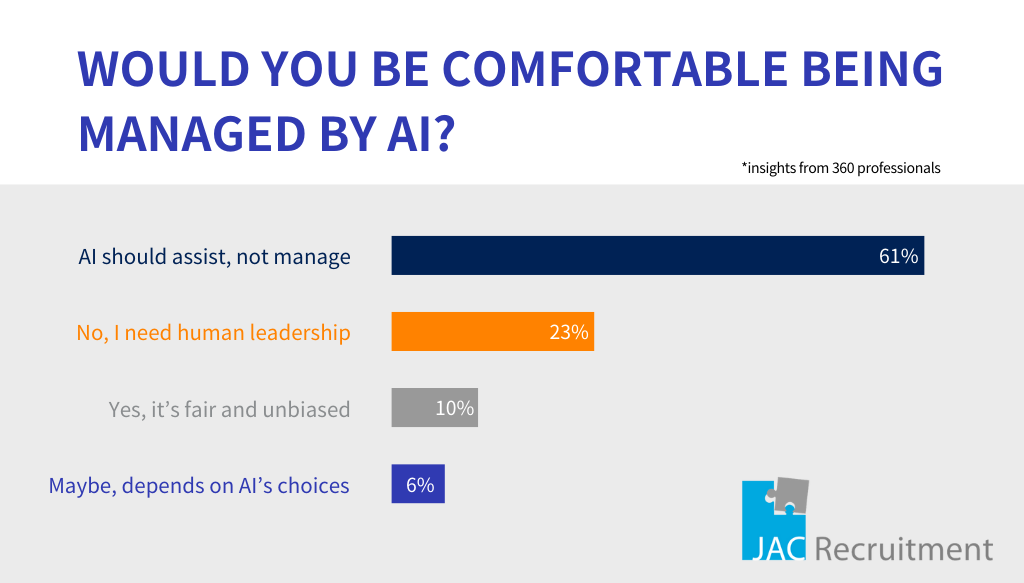As artificial intelligence steadily reshapes the workplace, its role in leadership is becoming an increasingly important question. We are comfortable with AI supporting our workflows, optimising decisions, and providing data-driven insights. But when it comes to the idea of being managed by AI, the conversation becomes far more complex.
Our recent poll revealed a clear theme: most professionals are not rejecting AI outright, but they are cautious about how it is integrated into leadership roles. It is not simply a question of whether AI is capable, it is about control, trust, familiarity, and the evolving expectations we have of leaders.

Perhaps the real conversation is not about whether AI will lead, but about how leadership itself is being redefined in an AI-enhanced world.
Where We Are Today: Control Trust and Familiarity
Control vs Collaboration
In the poll, a majority (61%) expressed a preference for AI to assist rather than manage. This suggests that professionals are open to AI enhancing decision-making, but they want humans to retain final authority.
This view likely reflects a broader comfort with AI handling routine, repetitive, or data-heavy tasks, but not those involving people dynamics, leadership presence, or contextual judgement.
Leadership may be evolving from command-and-control to a shared model, where the human remains at the center, supported by AI’s speed and precision.
Is Leadership Still a Human Concept?
Interestingly, nearly a quarter of respondents (23%) said they still require human leadership. This highlights a deeper emotional expectation we have of our leaders – empathy, shared experiences, the ability to understand nuance beyond data.
This likely varies depending on the nature of the role and the industry. In highly human-centered functions like career consulting, coaching or hiring, human connection still drives value and trust.
While AI can guide decisions, it cannot replicate the shared understanding that people seek from real-life leaders.
Fairness vs Familiarity
Only 10% said they would be comfortable being managed by AI because it is “fair and unbiased.” That raises an interesting dynamic: while fairness is one of AI’s selling points, it may not be enough if it doesn’t feel personal.
People may still prefer human imperfections over machine logic, especially in situations that involve judgement, career development, or sensitive feedback.
Fairness alone will not earn trust if the process feels cold or detached.
The Curious Middle Ground
A smaller, but notable group (6%) chose “Maybe, depends on AIs choices.” This group reflects a growing, nuanced attitude toward AI in leadership: trust is not binary; it is situational. Some tasks like data analysis might be perfectly managed by AI, while others like mentoring, conflict resolution or career development might always require a human touch.
Perhaps AI’s future in leadership is not about replacing managers, but about building trust gradually, decision by decision.
The Growing Pains: Resistance or Readiness Gap?
At first glance, the data might suggest resistance to AI. But looking deeper, it could reflect a readiness gap.
The hesitation might not be about AI’s potential to lead, but about how AI leadership is introduced, explained, and integrated into workplaces. Transparent communication, explainable AI systems, and thoughtful change management could play a critical role in easing this transition.
Rather than fearing resistance, organisations might ask: How can we prepare our people, culturally and emotionally, for a future where AI plays a bigger role?
Looking Ahead: Evolving Roles and New Skills
Evolution of the Manager Role
As AI continues to take over administrative tasks like scheduling, performance tracking, and analytics, the traditional role of managers may shift. Instead of focusing on oversight, future managers might become coaches, mentors, and culture builders, role that machines cannot replicate.
Paradoxically, the rise of AI might require leaders to become more human, not less. The core of leadership may move away from control toward emotional intelligence, vision-setting, and the ability to inspire.
Skill for the Future
If AI handles operational complexity, what skills will set future leaders apart?
Adaptability, emotional intelligence, strategic thinking, and the ability to manage human-AI collaboration will likely become critical.
“Managing with AI” may soon be a leadership competency itself, where success lies not in resisting technology, but in harnessing it to enhance human strengths. This is especially true for tech-enabled industries or data-driven roles. IN human-facing industries like consulting, education, or healthcare, however, the need for emotional connection will remain irreplaceable.
Conclusion: A New Kind of Leadership?
The conversation around AI in leadership is just beginning. While skepticism remains, the poll results suggest that professionals are not rejecting AI, they are simply asking for thoughtful integration, clear communication, and a human-centered approach.
In the future, leadership may not be about choosing between humans or AI. It may be about redefining leadership itself: combining technological capabilities with deeply human qualities to lead better, together.
Perhaps the leaders of tomorrow won’t just work alongside AI. They will know how to lead in ways that only humans can.
As leadership expectations shift in an AI-enhaced world, one thing remains constant - hiring the right people still matters most.
If you are thinking about the future of leadership in your team, our consultants can help you find leaders who thrive in change, not just manage it.


